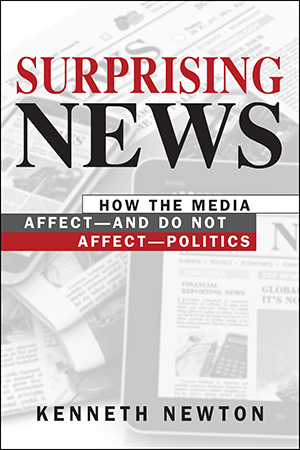
- 2019/277 pages
Surprising News:
How the Media Affect—and Do Not Affect—Politics
Hardcover: $89.95
ISBN: 978-1-62637-766-0
Paperback: $28.50
ISBN: 978-1-62637-770-7
Ebook: $28.50
ISBN: 978-1-62637-825-4
What role do the media play in influencing political life and shaping public opinion and behavior? Do they support—or undermine—our democratic beliefs and institutions? Claims about the media’s powerful influence are frequently made, but where is the evidence?
Kenneth Newton scrutinizes these complex questions. Recognizing that differing forms of political communication have differing effects on differing people around the world, Newton goes further to ask why this occurs, and how. The answers that he presents in Surprising News offer a deeply researched, enlightening challenge to conventional wisdom in this age of fake news, post-truth, and claims about how the new digital media have transformed politics.
Kenneth Newton scrutinizes these complex questions. Recognizing that differing forms of political communication have differing effects on differing people around the world, Newton goes further to ask why this occurs, and how. The answers that he presents in Surprising News offer a deeply researched, enlightening challenge to conventional wisdom in this age of fake news, post-truth, and claims about how the new digital media have transformed politics.







